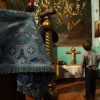As we settle back into the “ordinary time” of our liturgical year, it’s important to recall the special value and importance of this season. “Ordinary” should be understood as a technical term, which refers to a specific period in our yearly celebration. In the conventional sense, there is nothing “ordinary” about it at all. From feasts dedicated to saints (Peter and Paul, St John Baptist, Father Herman of Alaska…) to the Great Feasts of Transfiguration and Dormition, this period that concludes the yearly cycle of services is one of exceptional richness.
It is also the period after Pentecost, during which we experience with particular intensity the personal presence and illuminating grace of the Holy Spirit. This experience becomes ours especially in times of prayer, both personal and liturgical.
St Basil the Great develops this theme in a remarkable section of his treatise On the Holy Spirit. Chapter 26 discusses the proper usage of the little preposition in when we speak of the Spirit and His operations. The Spirit, he says, dwells in those who strive to live the life in Christ in the same way that form is present in matter. This language goes back to Aristotle, for whom the essence, substance or “form” of a reality exists within that reality itself, rather than on a transcendent “ideal” plane, as his teacher Plato taught. St Basil uses an Aristotelian understanding of the relation between form and matter to describe the indwelling presence of the Spirit within the saints. Just as the form or essence of a thing exists in and is inseparable from the thing itself, so the Holy Spirit exists and dwells in those who receive Him, and He does so to such an extent and with such transforming power, that “such a person no longer lives according to the flesh, but is led by the Spirit of God. He is called a son of God, because he is conformed to the image of the Son of God; we call him a spiritual man.”
This is an extraordinary statement. It means that the Holy Spirit, received initially through baptism and chrismation, actually transforms our very being, our “essence” or “form,” to the point that we are “conformed to the image” of Christ. We become “spiritual beings,” oriented and directed no longer according to the flesh, but according to the Spirit, who is God Himself.
At the close of this same chapter, St Basil alludes to a passage from the apostle Paul: “The Spirit helps us in our weakness; for we do not know how to pray as we ought, but the Spirit Himself intercedes for us with sighs too deep for words” (Rom 8:26). Basil concludes, “If you remain outside the Spirit, you cannot worship at all, and if you are in Him you cannot separate Him from God. Light cannot be separated from what it makes visible, and it is impossible for you to recognize Christ, the Image of the invisible God, unless the Spirit enlightens you.” 2
This means first of all that authentic worship is possible only through the indwelling power of the Holy Spirit. Yet beyond that, it implies that true prayer is not a human endeavor at all. It is the work of God within us. In prayer, God speaks to God; the Spirit addresses the Father within the temple of the heart. Through that divine work, the Spirit illumines for us and within us the “face,” the image and glory, of the Son. Bathed in the radiant light of that divine Image, we “recognize” Christ: we behold Him as Lord and Savior, the Crucified and Risen One. And that Image in turn reveals to us the Face of the Father.
Prayer, then, is a constant inner movement of the heart: in the Spirit, through the Son, to the Father. Realized “in spirit and truth” (Jn 4:23) – that is, in the Holy Spirit and in Christ who is the Truth – authentic prayer is a pure gift, bestowed by the Holy Trinity, to illumine and transform our life so thoroughly that it “conforms us to the image of the Son of God.”
There is little doubt that for most of us this exalted image of prayer lies far from our daily experience. Throughout the day we may have an ongoing conversation of sorts with God, easily interrupted by the telephone, or a child who needs our attention, or random yet demonic “thoughts” that intrude on our efforts to pray. We may take a few minutes during the morning or evening to step back and find a little peace and quiet, to read a few lines of Scripture or to offer a few words of intercession for someone we love. But we rarely, if ever, experience ourselves to be “filled with the Spirit,” as Christians of other confessions often feel themselves to be.
For Orthodox Christians, the experience of the Spirit and of genuine worship usually takes a different form. Remaining wary of the emotional exuberance that can turn worship into a pep-rally or reduce it to some sort of spiritual entertainment, we find ourselves truly and deeply moved by the Holy Spirit in the silence of personal meditation, in the solemn beauty of liturgical chant, or through sharing with someone else a prayer of petition or thanksgiving.
We may not pray in tongues, or prophesy, or perform astonishing miracles. But insofar as we remain open to the inner working of the Spirit, allowing Him to intercede for us “with sighs too deep for words,” we can be sure that our prayer is real and genuine, that it is heard and welcomed by God. Then, in rare moments, by the illumination of that same Spirit we can actually “behold Christ,” the Image, and through that illumination find ourselves led into an intense and joy-filled communion with the Father.
















